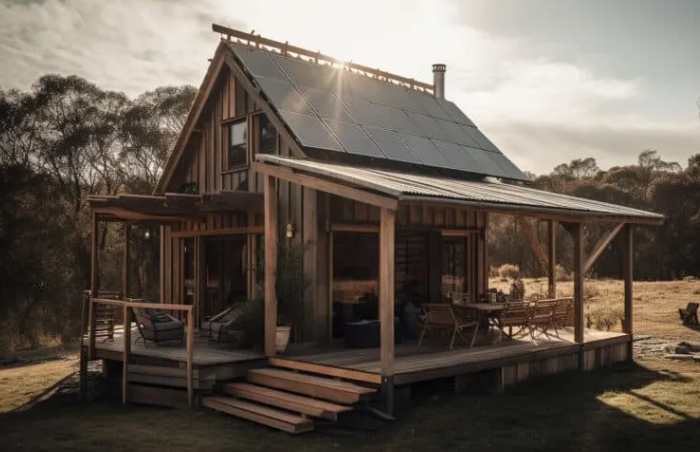Living off the grid is a growing trend among those seeking a self-sustaining, eco-friendly lifestyle. Crete, the largest of the Greek islands, offers an ideal setting for such a way of life, with its abundant natural resources, mild climate, and rich tradition of self-sufficiency. Whether you dream of a remote mountain retreat or a seaside homestead, Crete provides the perfect backdrop for living independently and sustainably. This guide explores the essentials of off-grid living in Crete, from sourcing energy and water to growing food and building community.
The Appeal of Off-Grid Living
Off-grid living involves disconnecting from public utilities and relying on alternative resources for electricity, water, and other necessities. The benefits include reduced living costs, a smaller environmental footprint, and a closer connection to nature. In Crete, the appeal is enhanced by the island’s natural beauty, fertile land, and a culture that values self-reliance and community.
Energy Independence
Securing a reliable source of energy is crucial for off-grid living. In Crete, solar power is an excellent option due to the island’s abundant sunshine.
Solar Power: Installing solar panels is a practical and sustainable solution. Modern solar technology can generate sufficient electricity for household needs, including lighting, appliances, and heating. Battery storage systems ensure that power is available even during cloudy periods.
Wind Power: Wind turbines can complement solar panels, particularly in coastal and elevated areas where wind is consistent. Small-scale wind turbines can provide additional energy, reducing reliance on solar power alone.
Hydro Power: For properties near streams or rivers, micro-hydro systems can be a viable option. These systems harness the flow of water to generate electricity, offering a continuous and reliable power source.
Water Management
Access to clean water is essential. In Crete, several methods can be employed to secure a sustainable water supply.
Rainwater Harvesting: Installing rainwater collection systems is a cost-effective way to capture and store water for household use. This can include roof gutters leading to storage tanks and filtering systems to ensure water quality.
Wells and Springs: If your property has access to a natural spring or well, these can provide a consistent source of fresh water. It’s important to test the water for safety and install a pump system if necessary.
Desalination: For coastal properties, desalination systems can convert seawater into potable water. While these systems can be energy-intensive, advances in technology have made small-scale desalination more feasible for off-grid living.
Food Production
Growing your own food is a cornerstone of self-sustaining living. Crete’s fertile soil and favorable climate allow for year-round cultivation of a variety of crops.
Vegetable Gardens: Start with a vegetable garden to grow staples such as tomatoes, cucumbers, peppers, and leafy greens. Raised beds and drip irrigation can maximize yield and conserve water.
Fruit Trees: Planting fruit trees like olives, figs, oranges, and pomegranates provides a perennial source of fresh produce. These trees are well-suited to Crete’s climate and require minimal maintenance once established.
Livestock: Keeping chickens for eggs, goats for milk, and bees for honey can enhance food self-sufficiency. These animals also contribute to the ecosystem by providing manure for composting and pollination for crops.
Building Sustainable Homes
Constructing an eco-friendly home is essential for off-grid living. Sustainable building practices reduce environmental impact and enhance energy efficiency.
Eco-Friendly Materials: Use locally-sourced, natural materials such as stone, wood, and clay. These materials are not only sustainable but also blend harmoniously with the natural landscape.
Passive Solar Design: Design your home to take advantage of natural light and heat. Large south-facing windows, thermal mass floors, and proper insulation can reduce the need for artificial heating and cooling.
Water and Waste Management: Implement greywater recycling systems to reuse water for irrigation. Composting toilets and septic systems can manage waste efficiently without relying on municipal services.
Building Community
Living off the grid doesn’t mean living in isolation. Building a supportive community enhances the off-grid lifestyle.
Local Networks: Connect with other off-grid residents and local farmers. Sharing resources, knowledge, and skills can be mutually beneficial.
Markets and Co-ops: Participate in local markets and cooperatives. Selling or trading surplus produce, eggs, or handmade goods can provide additional income and foster community bonds.
Workshops and Education: Engage in workshops and educational programs on sustainable living practices. Learning and sharing new techniques helps to continuously improve self-sufficiency.
Conclusion
Living off the grid in Crete offers a rewarding path to self-sufficiency and sustainability. By harnessing natural resources for energy, water, and food, you can create a lifestyle that is not only environmentally friendly but also deeply fulfilling. The island’s supportive community and rich cultural heritage provide a perfect backdrop for this way of life. Embrace the journey of off-grid living in Crete, and enjoy the freedom and connection to nature that it brings.


